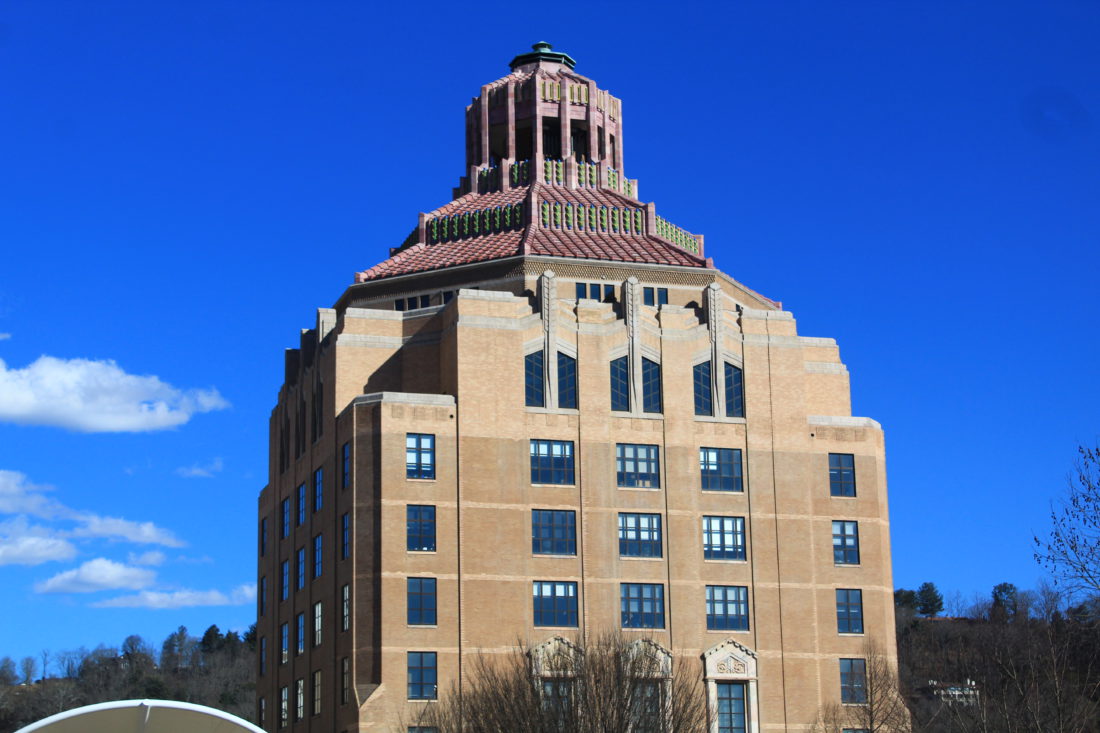Residents of Asheville have done a lot of listening about the city’s budget for fiscal year 2022-23. Since February, City Council has held three work sessions, a retreat and a presentation from City Manager Debra Campbell on the spending plan, none of which have allowed public comment.
Come Tuesday, June 14, it’s the public’s turn to talk. Council will hold a hearing on Campbell’s proposed budget during its 5 p.m. regular meeting; a final vote on approving the document is expected for Tuesday, June 28.
In anticipation of that hearing, Xpress has pulled 10 noteworthy takeaways from the proposed budget. The complete budget document is available online at avl.mx/bnr.
- Phantom police. The Asheville Police Department’s budget lists a headcount of 269 positions and projects spending over $24.1 million in salaries and benefits. However, as confirmed by city spokesperson Kim Miller, the APD expects about 40 of those 269 positions to remain vacant over the next fiscal year — and funding for those officers is not included in the budget. Staffing the department to its listed strength, she said, would cost about $2.7 million beyond the currently requested allocation.
- Waiting on buses. Asheville continues to delay implementation of the Transit Master Plan, a scheme for expanding the city’s bus system approved by Council in 2018. Campbell cited “operational challenges created by the driver shortage and the financial impact of lower parking-fund support” as reasons for not moving forward with changes that had originally been scheduled for October 2021. The proposed budget for the Transit Services has also been cut by over $430,000 from fiscal 2021-22 levels, primarily due to a reduced subsidy from the Parking Services fund. (The city lost roughly $800,000 in parking revenue this fiscal year due to malfunctioning equipment at its parking decks.)
- Reduced reparations. The budget allocates $365,000 to the city’s community reparations effort, an amount meant to replace the money already spent on consulting firm TEQuity to oversee the program. The sum is significantly less than the $1.2 million Campbell proposed in her recommended fiscal year 2021-22 budget or the $2.1 million Council eventually allocated using proceeds from the sale of city-owned land. Buncombe County has proposed spending $2 million on reparations in its own fiscal 2022-23 budget.
- Getting on track. Council unanimously approved a six-lane track for Memorial Stadium at the request of the historically Black East End/Valley Street neighborhood March 22, but members didn’t specify how the city should pay for it. Campbell’s budget calls for $2.5 million in federal American Rescue Plan Act funds to support much of the work, an approach Council member Sage Turner opposed during an April 12 work session.
- A new department. Asheville has created a new division of city government, the Community & Regional Entertainment Facilities Department, to oversee flagship facilities such as the WNC Nature Center and John B. Lewis Soccer Complex. The department has a proposed budget of over $2.26 million and includes 18.5 positions; Miller says the workers and budget were drawn from the city’s Parks & Recreation and Community & Economic Development departments.
- Homelessness help. A new “homeless strategy project specialist” position, to be added at an estimated annual cost of $92,000, will help the city address its growing homeless population. The budget also includes $50,000 in recurring funds for Code Purple winter shelter; until now, support for the program has come from grants or affordable housing bond proceeds.
- Partnership grants are back. After suspending the grant process this fiscal year, the city plans to resume making awards from its Strategic Partnership Funds. A total of $711,000 will be available for grants to community partners, including $469,000 in previously unspent money and $242,000 in newly allocated funds. According to the budget document, the new process will have a “specific focus on outcomes to close the opportunity gap.”
- Research paper. The budget includes funding for several studies to inform Asheville’s future work. The largest such allocation puts $375,000 toward a new study of gender and racial disparities in city contracting. Another $85,000 will support research into “missing middle” housing, such as townhomes and duplexes, and recommended policy changes to encourage its construction. And $60,000 will pay for an update to the Housing Needs Assessment, better known as the Bowen Report.
- Someday online. The Finance & Management Services Department has requested $50,000 to create a “web-based budget document” that would make the city’s financial information more accessible. If the money is approved, says Miller, the department hopes to have the resource available sometime during the upcoming fiscal year. (Buncombe County has a robust online budget explorer, available at avl.mx/9hc.)
- Who’s watching? The city organizational chart accompanying the budget notes that Asheville’s Internal Audit Department, tasked with ensuring the integrity of the government’s financial operations, has no director. Patricia Rosenberg, who previously held that position, left the city in October.




Before you comment
The comments section is here to provide a platform for civil dialogue on the issues we face together as a local community. Xpress is committed to offering this platform for all voices, but when the tone of the discussion gets nasty or strays off topic, we believe many people choose not to participate. Xpress editors are determined to moderate comments to ensure a constructive interchange is maintained. All comments judged not to be in keeping with the spirit of civil discourse will be removed and repeat violators will be banned. See here for our terms of service. Thank you for being part of this effort to promote respectful discussion.